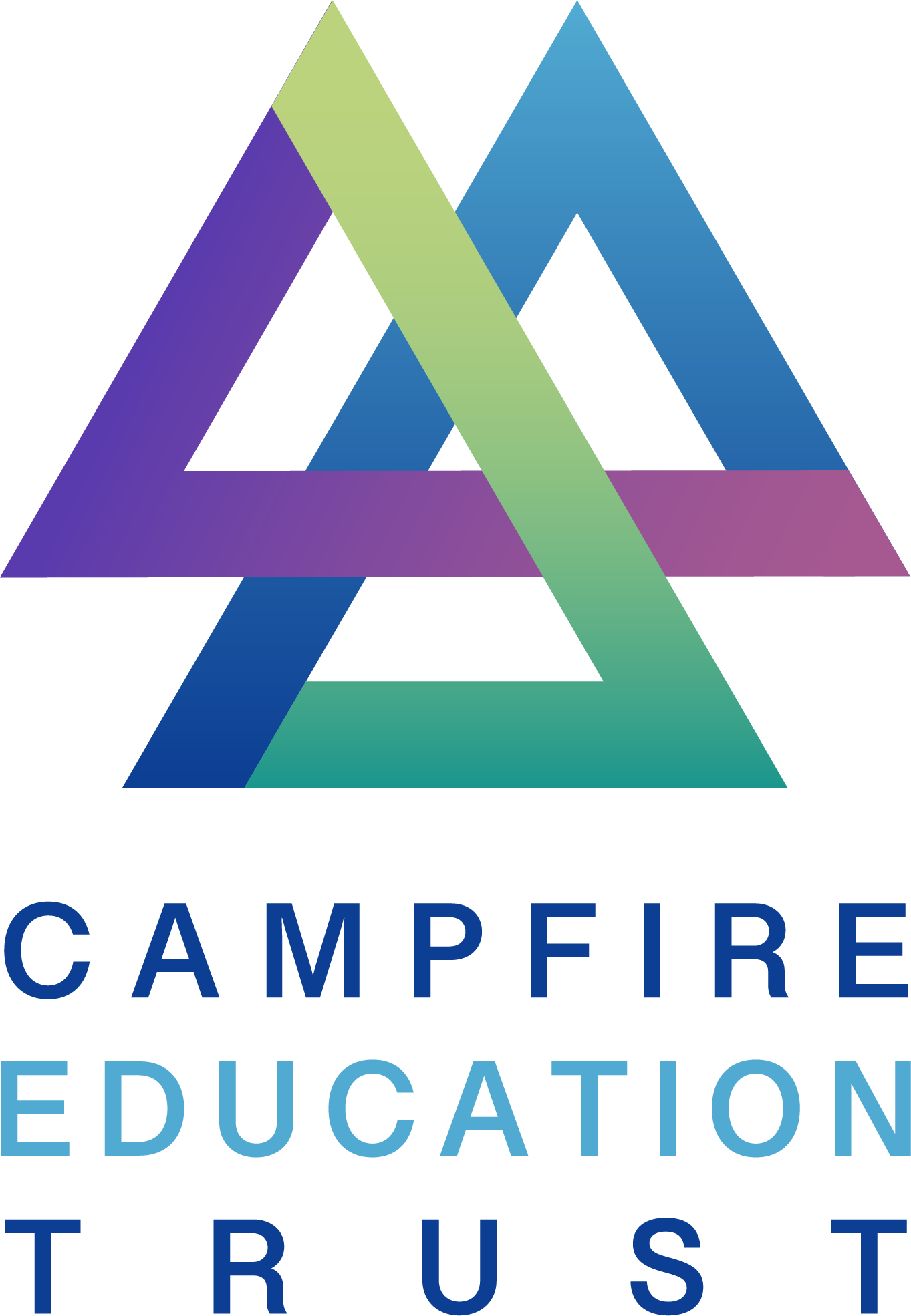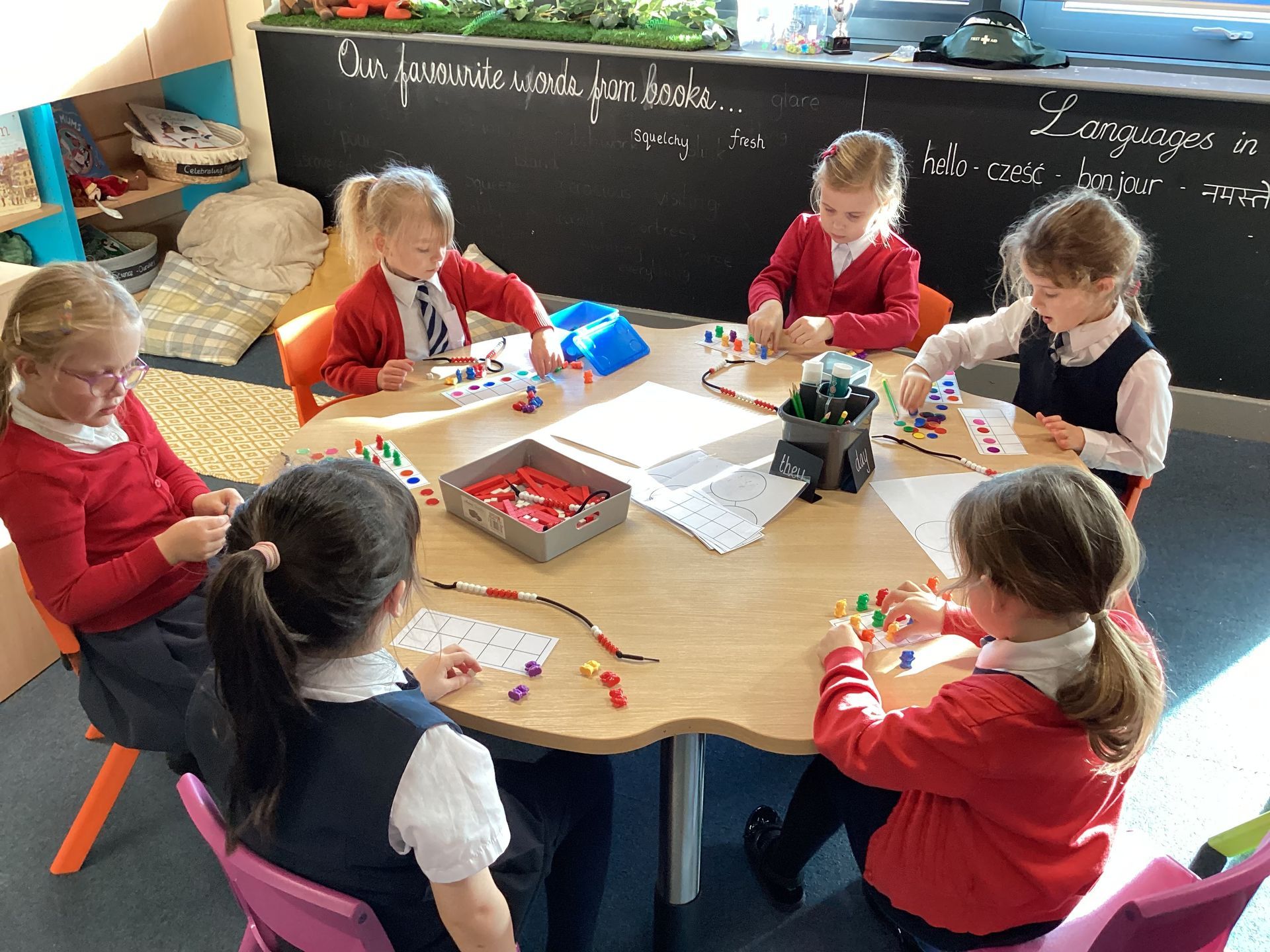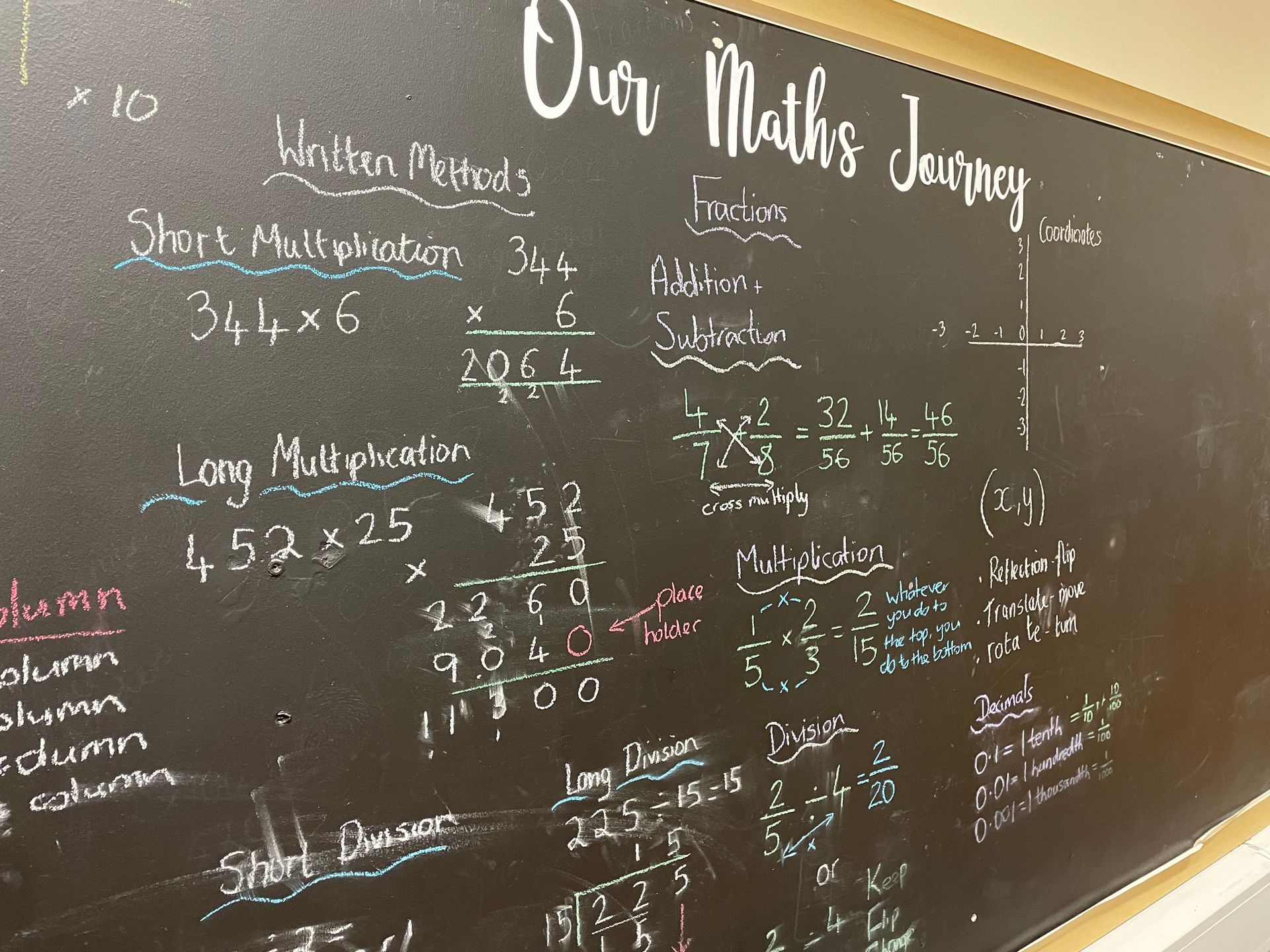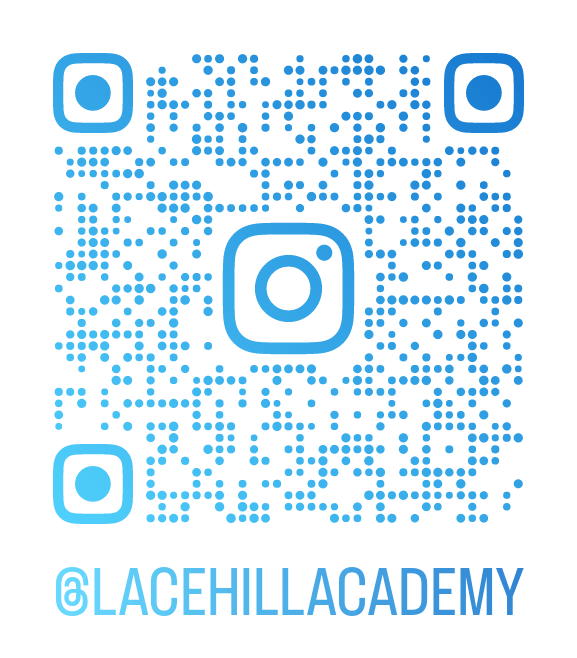Maths
Intent
The teaching and learning of mathematics is an integral part of every classroom. Through our maths curriculum, we aim to build resilience in our pupils, so that they are able to reason and explain ideas as well as use fluency skills to become confident mathematicians. We want our children to gain understanding and make connections between concepts so that they become successful mathematicians. We believe the best way to achieve this is to have a maths curriculum which allows children to revisit and build on the steps they already have. By revisiting previous learning, we are allowing the children to know more and remember more by transferring knowledge from their short-term memory to their long-term memory.
Parents are aspirational for their children and keen to see them become confident and fluent mathematicians. It is vital that parents recognise the need to study at depth within objectives rather than just moving on to the next year group. Using White Rose as a scheme helps to achieve this within lessons, which offers guidance to teachers and subject leads to plan and deliver lessons at the appropriate pace. It encourages depth and mastery within lessons for all children.
Our curriculum is based around the following knowledge:
Substantive knowledge (shown in the arrows pointing to the star)
- Number facts - Children need to be fluent in number facts such as number bonds, doubles and halves, equivalents, factor pairs, primes, etc. See fluency progression map below.
- Times tables - Children need to know their times tables up to 12x12 by the end of Y4. These underpin many aspects of mathematical learning (fractions, ratio, algebra, statistics)
- Symbols - Children need to recognise and understand mathematical symbols in order to be able to read and solve calculations
Procedural knowledge ( Methods)
Children need to know specific methods (both mental and written) and be able to apply these skills with any numbers. Methods include: Partitioning, Number lines, Column method, Short multiplication, Long multiplication, Short division
Disciplinary concepts
The children are taught these disciplinary concepts within all domains of mathematics across all year groups: Using and applying, investigating, reasoning, problem solving, analysing and justifying and proving.
This is how our children learn how to be successful Lace Hill mathematicians and achieve our intent below (also shown in the golden tail).
I am a Lace Hill mathematician because…
- I demonstrate quick and efficient recall of facts and procedures
- I am a mathematical thinker, who reasons and solves problems
- I feel confident using mathematical vocabulary
- I can make connections in my learning to new ideas and within the world around me
- I can describe, explain and represent mathematical concepts in a variety of ways
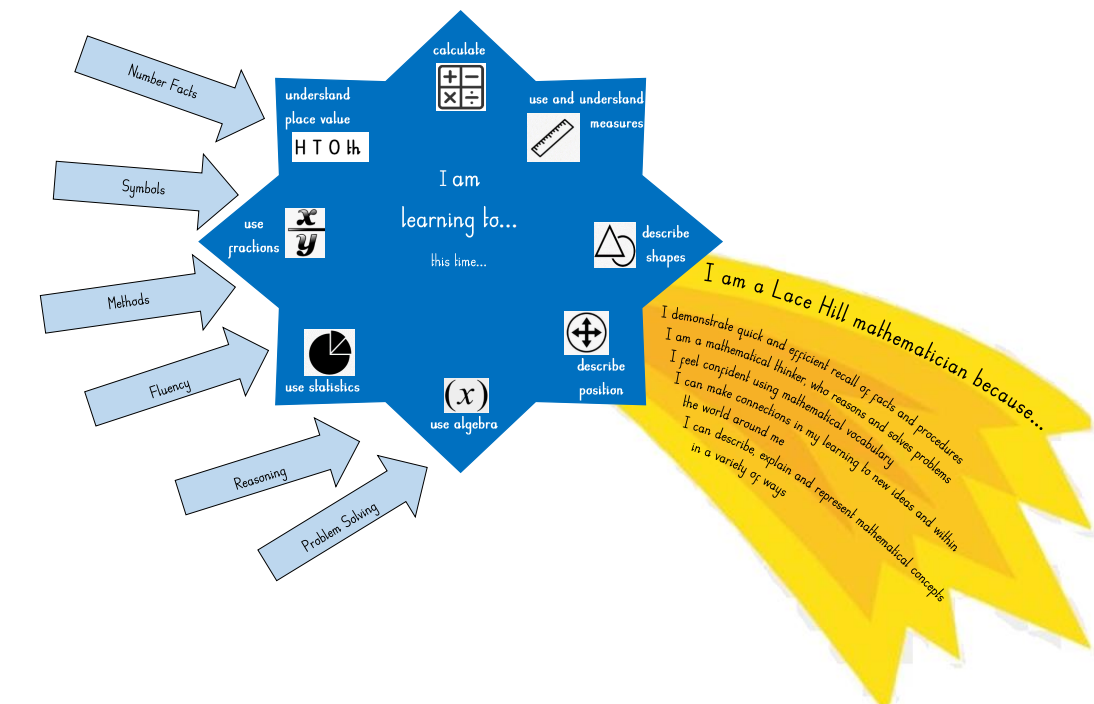
Implementation
We use White Rose as a supporting resource for teaching maths. It supports children in developing the five big ideas of mastery: coherence, connecting new ideas to known concepts; representation and structure, noticing patterns and making connections; mathematical thinking, working on, thinking and reasoning with a taught idea; fluency, quick and efficient recall of facts and procedures; variation, giving examples that display an idea as well as those that don’t for children to notice, and varying practice questions so that repetition is avoided.
Our teachers explicitly model skills to children through their use of teaching and learning time. They model vocabulary to enrich discussions of mathematical concepts and empower children to reason and problem solve. Children need to know how to explain their methods and understanding; through open questioning from adults, children develop their questioning and reasoning skills.
We follow a concrete, pictorial and abstract (CPA) approach which enables children to visualise the concept by using concrete apparatus first. These manipulatives are used and available across the school so that children can experience these throughout their learning journey.
List of services
-
ConcreteList Item 1
The unit of work will begin with introducing the skills through the use of real objects or mathematical equipment. This enables the children to ‘act out’ the skill following a ‘hands on’ approach. In division in KS1, for example, this could be done by separating apples into red ones and green ones or by sharing 12 biscuits amongst 6 children. In division in KS2, this could be done by using a place value chart and counters to create the number and then moving them on the place value chart to divide by 10, 100 or 1000.
-
PictorialList Item 2
When the children have understood the ‘hands on’ experience they them move on to representations such as a diagram or picture. In the case of a division exercise this may be the action of circling objects. In KS2 this will be a similar approach where the child may draw their own place value chart and draw arrows to complete the division calculation.
-
AbstractList Item 3
Finally, the child should be able to demonstrate the skills through mathematical symbols. For example: 12 ÷ 6 = 2. In KS2, the children will then use mathematical symbols to demonstrate their knowledge and understanding of the skill. For example: 345 ÷ 100 = 3.45
Times Tables Rockstars
Children in Y4 take part in a compulsory multiplication check test. Therefore it is vital that all children have a secure knowledge of the times tables facts as soon as possible. Children in Key Stage 2 all use a programme called Times Tables Rockstars which is an online game where they practise and revise their times tables. This software has many different game plays available to the children: Soundcheck, where children have individual timed questions to answer; Studio, where children can set their baseline speed and earn a ‘rock status’; Garage, where teachers set individualised times tables for children to practise; and other multi-player options for the children to challenge one another and play against other children.
All of the children have a login and password which they can use to practise times tables in school and at home. Children may use TT Rockstars at school to support them in improving their times tables recall. This software is a great opportunity for children to use devices to improve their learning. We strongly encourage all children to take advantage of this game at home to really secure their times tables knowledge.
Useful websites to support the maths learning taught at Lace Hill:
https://play.ttrockstars.com/ - Times Tables Rockstars
https://www.mathschase.com/ - times tables website
https://www.topmarks.co.uk/maths-games/hit-the-button - also available as an app, no log in required
Impact
Children leave Lace Hill Academy as mathematical thinkers who can make connections in ther learning to the world around them and are ready for the next stage in their education as defined by our mathematics 'golden box'.
The impact of our mathematics curriculum is measured through:
- Pupil outcomes where evidence is gathered in the following ways: pupil voice interviews, book scrutinies, learning walks, discussions with staff etc.
- Using summative assessment, formative assessment and book scrutinies to ensure children reach year group expectations
- Monitoring of progress from year to year ensuring pupils remain ‘on track’ from their starting point
- Moderation and scrutiny of pupil’s books and professional dialogue
- Marking of written work in books against the school’s marking policy
- Identifying clear next steps in school improvement, which are determined by a cycle of monitoring, evaluating and reviewing.
Here is what our some of our pupils say about maths at Lace Hill Academy:
'I like that maths challenges me.'
'I like solving equations and reasoning in maths lessons.'
'I have fun in maths and we can use different things to help us like counters.'
'I enjoy having the opportunity to ask other children questions to help me with my maths when we draw pie charts.'
'I like learning my times tables and using TTRockstars to help me.'


